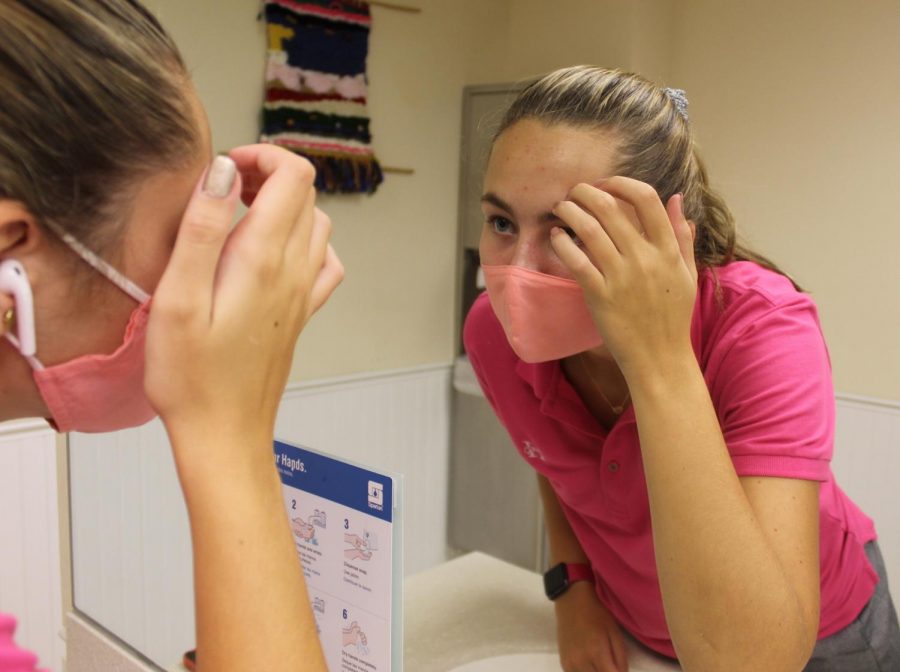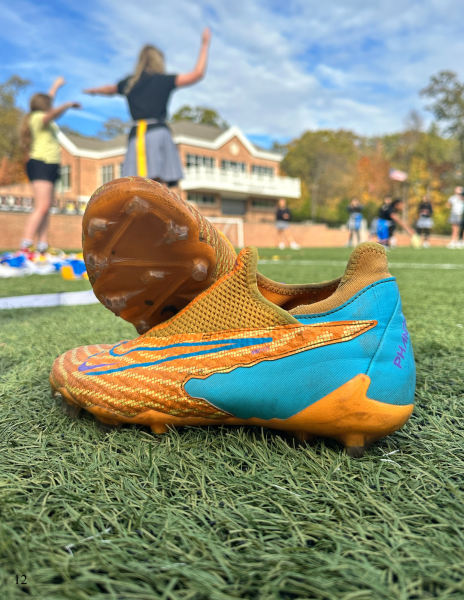Maskne And How to Treat it!!
Senior Lillian Barcroft takes a quick glance at her skin in between classes.
Skin care is known to be a normal struggle amongst all teenagers. As they grow up, their hormones stimulate their oil glands, causing their skin to develop acne. Although it is known to be a mundane struggle for all teenagers and adults alike, sticking to a skin care routine may be difficult, as there is now a global pandemic.
Due to the widespread of the infamous Coronavirus, or COVID-19, the Center for Disease Control and Prevention (CDC) has suggested that everyone across the United States should wear a face mask and stay six feet apart from each other. While it is beneficial to wear a mask for safety and health reasons, wearing a mask daily can cause a different type of acne, maskne. Dr. Lauren Pyler, a nurse practitioner at Levy-Dermatology, said that maskne is caused by the humid environment in the mask, created by natural heat and heat from breathing, which allows the yeast and staph bacteria on the skin to flourish.
“My first recommendation to them [her patients] is to always switch to a surgical mask,” Mrs. Pyler said. “You wear them, you can throw them away. It’s so easy.”
About 18% of the Upper School students use surgical masks, while 77% use cotton, and 6% wear masks of some other material. The reason why Mrs. Pyler recommends that surgical masks should be worn is because not only are they breathable, unlike cotton masks, they trap in less bacteria, which decreases the chance of the staph bacteria multiplying and spreading, and they cause less irritations.
“If you do use a cotton mask, you really need to be washing it every single day, and then drying it every single day,” Mrs. Pyler said. “It needs to be completely dry because if not, there’s just more moisture.”
Luckily enough, about 65% of the Upper School students, who wear cotton masks or other, wash their masks after usage, while the other 35% don’t. Along with recommending washing cotton masks after usage, Mrs. Pyler suggests that cotton masks should be cleansed with a liquid-cleanser that is fragrance free, instead of detergent because it can cause irritations on the skin. Although it is widely known that it is important to wash and moisturize your skin, she strongly recommends that students wash their face twice a day, but not over-cleanse, as it strips away the moisture barrier that the skin needs. She also recommends moisturizing, after washing.
“Scale back to the basic products,” Mrs. Pyler said, “Just use the thinnest layer of the products you have. Don’t add any chemicals or scrubs that add any irritation or inflammation.”
Not only does she recommend students to scale back to using basic products, Mrs. Pyler advises against the use of charcoal, soap, and clarisonic, as it isn’t good for the skin. She also said that using brushes doesn’t help because it inflames the skin.
“Just wash your face with your fingers and warm water….it allows the skin to have more blood flow.”
Additionally, Mrs. Pyler recommends that people not wear any makeup, as it clogs up all the pores. Good thing for the students, about 72% of the Upper School students don’t wear makeup at all; however, about 28% of Upper School students do wear makeup.
It is important to wear a mask, as it is for the sake of preventing the spread of COVID-19. However, it is also important to take care of your skin. All you need to do is to wear surgical masks (or wash your cotton masks with a fragrance free liquid-cleanser after usage), wash and moisturize your face twice a day with basic products, don’t use brushes, and wear no makeup. It may seem counterintuitive, but in the end, it’s all worth it.















